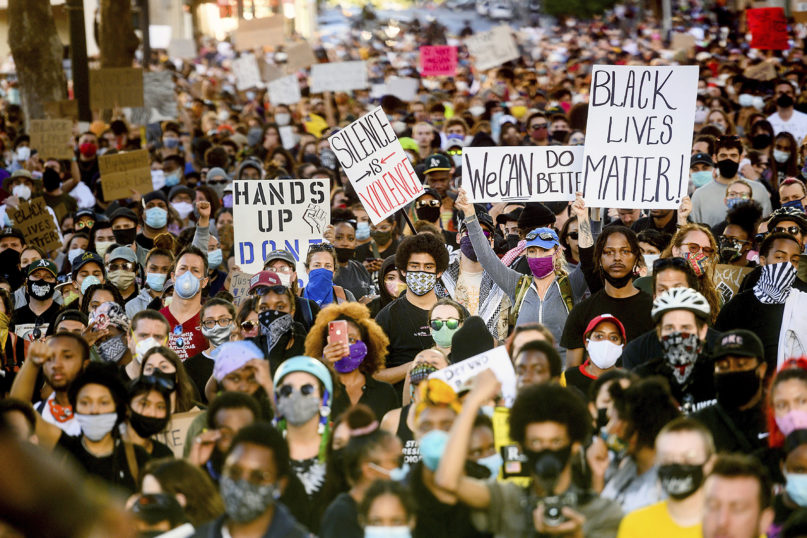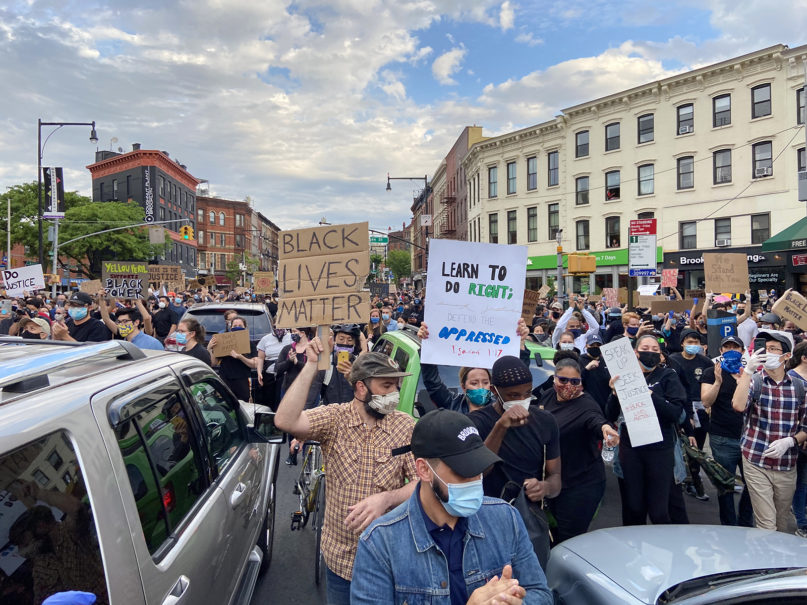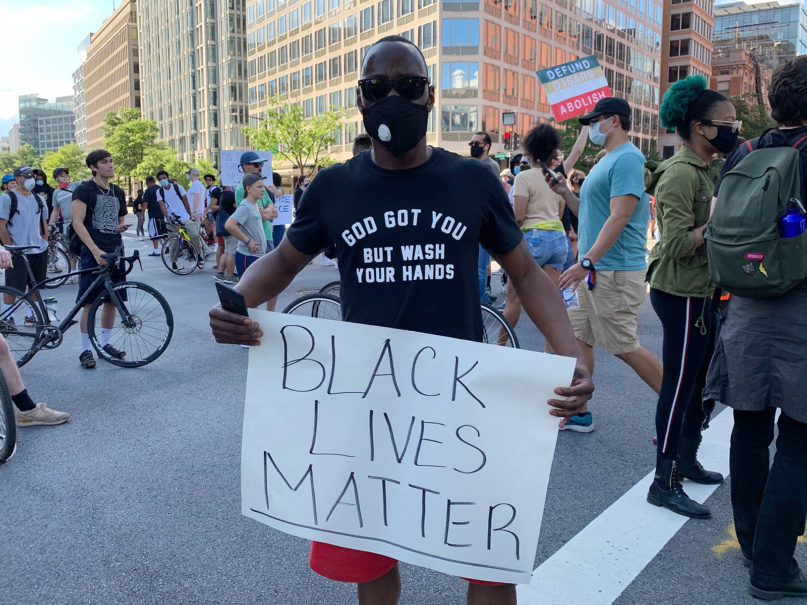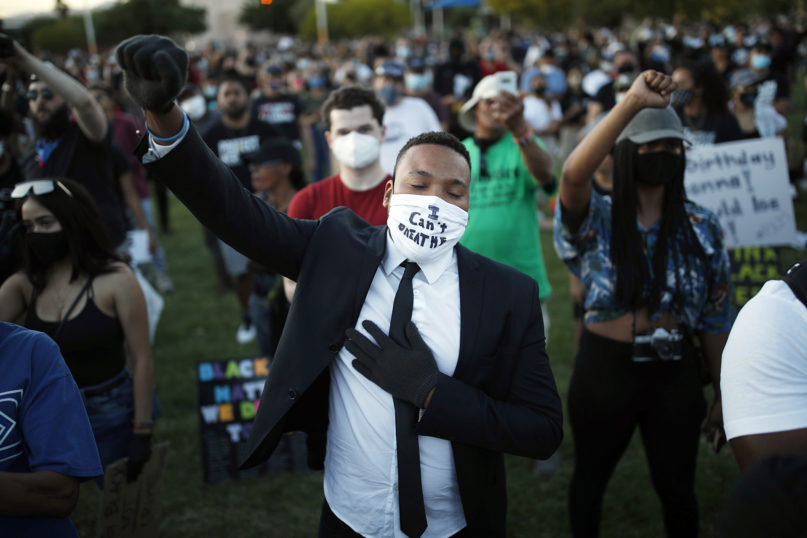(RNS) — This weekend, people of faith joined protests against racial injustice and police brutality across the United States.
Many also heard about those topics in the worship services they attended, most still online to slow the spread of the novel coronavirus.
There were calls for the church — and white Christians, specifically — to lament and repent of racism. There was encouragement for black Americans amid continuing headlines about the killings of George Floyd, Breonna Taylor and Ahmaud Arbery. There were conversations centering the experiences of people of color and calls for justice.
And there was affirmation that black lives matter.
RELATED: Mosques across America dedicate Friday sermons to confronting racism, police brutality
Here are excerpts from several sermons this weekend.
The Rev. Dr. Jacqueline J. Lewis, Middle Collegiate Church, New York City
“Family, every time I turn on the news these days it seems like politicians, pundits and preachers are all talking about how things never will be the same again. I pray this is true. I do not want to live in a world in which white supremacy keeps its knee on the necks of people of color. Calling systemic, structural and institutional racism a public health crisis, UCLA Center for Health Policy Research recently reported that while black people make up 13% of the U.S. population, we account for 24% of COVID-related deaths where numbers are reported. The image of George Floyd pleading for his life, face smashed into the street while police officers knelt on him, is indelibly imprinted not only on my consciousness, but on the consciousness of the globe. Decorated African-American EMT Breonna Taylor, whose birthday was two days ago, was shot to death while sleeping in her bed. It now turns out that Ahmaud Arbery was not only stalked, but kind of hunted, and that the drivers used their trucks to pen him in, and he was hit by the truck before shot to death just for jogging while black. Who can bear the blatant disregard for black life?
… When we say, ‘Black lives matter,’ what we mean is to create a nation and a globe in which the darkest of us, the most disenfranchised of us, the most despised of us are centered and celebrated as children of the Holy One, created in God’s image, beautiful and fabulous, and when we do this, we will heal this land of the ‘-isms’ that kill us.”
Pastor Greg Laurie and Dr. Tony Evans, Harvest Christian Fellowship, Riverside, California.
Before airing a conversation he recorded earlier with Evans, senior pastor of Oak Cliff Bible Fellowship in Dallas, Laurie noted the turmoil in the country and said the church is “the place to talk about this.”
Laurie, who is white, said:
“Our country is in turmoil right now because of the tragic killing — and I would classify it as a murder — of George Floyd. This man had a knee of a police officer on his neck. He wasn’t able to breathe. He said repeatedly, “I can’t breathe,” and even called out, “Mama,” which is just so heartbreaking to watch this. It’s really opened up an important national conversation, and also there’s a lot of conflict on our streets right now. I want you to know, I can only speak for myself and maybe my family, but we’re listening. We’re wanting to understand. We’re wanting to learn. We don’t know what it’s like to walk in the shoes of an African American person.”
In their conversation, Evans, who is black, said:
“Because the church was complicit in so much of what we are still seeing the aftermath of today, the spiritual has not been addressed on the level that it needs to be, and God is not going to skip the church house to fix the White House. Until the church of Jesus Christ decides it’s going to be a comprehensively biblical church and not just pick and choose the areas where we want to be full-time Christians and not part-time saints then we will not see the resolution to this crisis, because if God causes your distress, you need God to fix what God causes. … As long as there’s division on Sunday, there’s going to be chaos on Monday. The church of Jesus Christ has got to take ownership of its responsibility because God always starts with his people to determine what happens with everybody else.”

Several thousand demonstrators gather in Oakland, California, on June 1, 2020, to protest the death of George Floyd, who died after being restrained by Minneapolis police officers on May 25. (AP Photo/Noah Berger)
The Rev. Mariama White-Hammond, A Memorial for George Floyd and A Call for Unity at Bethel AME Church, Boston
“All across this country, multitudes have been gathering. They are standing up and speaking out. Sometimes their frustration has overflowed. Sometimes there’s been some violence. Sometimes the violence has been started by law enforcement. The violence is not helpful, but the anger is righteous. For any time humans take the life of another human because they look suspicious or because of a questionable warrant or even over $20, God’s heart is broken and so should be all of ours. The truth is that this nation has been breaking God’s heart since settlers arrived on this shore, dispossessing and massacring Native Americans, trafficking in the lives and labor of African people, setting up borders and displacing communities which lived between what we now call Mexico and the United States. It is the same demonic spirit that sent Japanese people to internment camps, refused to accept Jewish people, sending them back to the Holocaust. It is the same spirit that allows us to lock up black and brown bodies at a rate that far exceeds any other nation. This spirit is what led to the dry and lifeless bones that Ezekiel sees in his vision.
Racism is not just bad, it is plain sinful. It breaks God’s heart. And what breaks God’s heart even more is when those of us who claim to be the people of God are complicit in the sin. Far too long, white American churches have been silent in the face of suffering by God’s children of African descent. … For this, the church must repent. No one who claims to speak for God can be silent in this moment.”
Imam Abdullah Faarooq, Islamic Society of Boston Cultural Center
In a Friday sermon focused on championing justice and peace, the Roxbury-based imam told worshippers that all Muslims are duty-bound to uphold goodness and forbid evil.
That simple moral imperative, Faarooq said, is critical in this moment:
“The Prophet Muhammad (peace be on him) gave us the instructions for what to do when we see the likes of what happened to this man, George Floyd, and what has happened to the world over the last five centuries. … He said, “If you see something wrong, you should stop it with your hands.” We unfortunately are unable to stop what is going on. So he went on to say, “If you are unable to do this, if your means are too weak and meager … then raise your voices against it. And if you’re unable to do that, then hate it in your heart.” … Until the heart of humanity changes, the world is not going to change because you cannot legislate love. You cannot legislate goodness.”

People participate in the “Prayerful Protest,” a march in memory of George Floyd and against police brutality, in Brooklyn, New York, on June 2, 2020. RNS photo by Roxanne Stone
The Rt. Rev. Mariann Edgar Budde, Washington National Cathedral, Washington, D.C.
Budde, diocesan bishop of the Episcopal Diocese of Washington, was outspoken last week about President Trump’s appearance in front of the historic St. John’s Episcopal Church, making clear the diocese was not notified before protesters were cleared from the area using tear gas.
She repeated her condemnation of Trump’s action on Sunday, along with praise for D.C. Mayor Muriel Bowser for standing her ground against the president, adding, “The debt to black America in this democracy continues.”
The bishop continued:
“There’s nothing new about a white police officer killing a black man, but this week, for all manner of reasons, our response is new. The heat is rising. We’re all being mixed together. We might actually have an opportunity to change some things in our country and our world that have been crying out for change for a very long time. Think of that possibility. What if the time is now?”
The Rev. Watson Jones III, Progressive Baptist Church, Chicago
“What is the proper response of the church? I gotta say I’ve been encouraged to see many in the body of Christ allow God to move their feet to the places where Jesus would stand. There have been some who have cried out aloud against the continued and perpetual injustice in this country, yet there are still those who are very silent. There are those who are sitting on the sidelines, not saying a word. There are those who name the name of Jesus who prefer preachers like myself to move on past this discussion, get back to the spiritual matters of the church. This is because many of them have an unbalanced and unbiblical understanding of worship. They do not see the relationship between the worship of God and justice for people. True worship does not exclude the notion of justice. In fact, worship that ignores justice is not worship at all, and I think Isaiah preaches to us in 2020, in the time that we currently find ourselves in, to say this: When injustice is present, the pursuit of justice is an act of worship.”
Rabbi Lizzi Heydemann, Mishkan Chicago
“For those among us who spent this week marching, protesting, donating, crying, reckoning, feeling guilty, feeling motivated, feeling inspired, feeling exhausted, fuming, raging, having a hard time sleeping, for us and for you Shabbat is an even more sacred space — necessary space to tap into the universal and expansive flow of love that runs within all of us, that connects all of us, that reminds all of us, reminds you that you are good and you are beautiful, and that each one of us is infinitely valuable and radically equal and completely and utterly a unique delight in God’s eyes. When the society you live in causes you to question the value of your life, Shabbat comes as a corrective. Each of us is entitled to a perfect world, and, one day a week, we stop the struggle to create that space within ourselves and our communities as best we can to replenish, to recharge and hopefully bring the best of ourselves to that work the rest of the six days a week to create that space out in the world.”

A man conveys a variety of messages while demonstrating in Washington, DC, Saturday, May 30, 2020. RNS photo by Jack Jenkins
The Rev. Gary Bernard Williams, St. Mark United Methodist Church, Los Angeles
In his Sunday sermon, Williams said: “Change is in the air.”
His sermon was available on Facebook, but some people were seen listening from the church pews. Churches in California now have permission to resume in-person services but with a limited number of congregants.
He said in part:
“Through all of the protests against black violence, God is keeping us. God continues to be on the side of those that are oppressed and marginalized. … This psalm has great meaning this morning because God kept us. For over 401 years, God has kept us as a people. From slavery, through segregation, through Jim Crow laws, through second-class citizenship, through mass incarceration, through police brutality, through all of that, God has kept us.”
The Rev. Stephanie Kendell, Park Avenue Christian Church, Manhattan
“White supremacy makes people and systems too proud to take the planks out of their own eyes and too cowardly to point out the speck in their neighbors’, and because of our complacency, there is not a white person among us who does not at least have a systemic plank in our own eye. But even more telling is that there are far too many white people who are proudly showing off the whole tree sticking out of their faces. White people are personally and systemically blinded by the trees and roots and planks and specks of racism in our eyes that we can’t see the divine image in the black lives in front of us. But just because we cannot see the divine image in black bodies does not mean it is not there. It means it has been lost in us. Black lives matter and black lives have always mattered because black lives are holy.”
The Rev. Dr. Otis Moss III, Trinity United Church of Christ, Chicago
Following a message last week that asked when the “someday” in the words of the famous civil rights song — “We shall overcome someday” — might be, Moss premiered a “sermonic film” titled “Weary Throats and New Songs.” In it, he encouraged his congregation to “resist, dare to sing and stay connected.”
Preaching on Psalm 137, he said:
“In exile, the Jewish Hebraic Hebrew community dared sing because if I sing, I remember I’m a child of God. Singing is a vaccine to moments of despair. Our mothers and fathers sang during protests because it galvanized people, causing our rhythm, breathing and spirituality to merge together as one. … As the darkness approaches in this nation, I dare you to sing and witness a candle ignite in your soul.”
National reporters Alejandra Molina and Aysha Khan contributed to this report.





